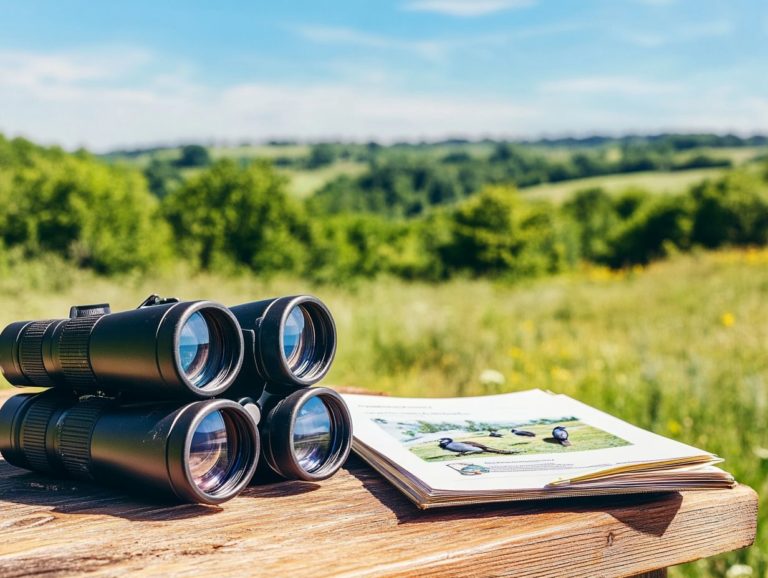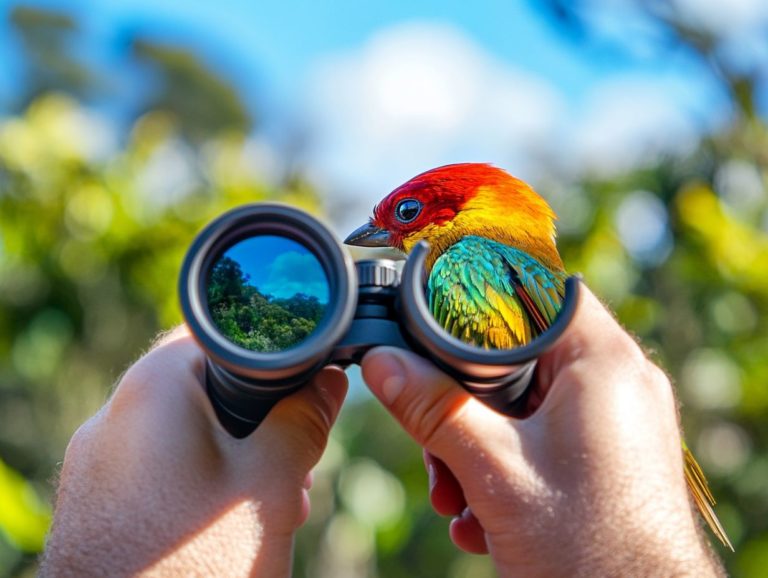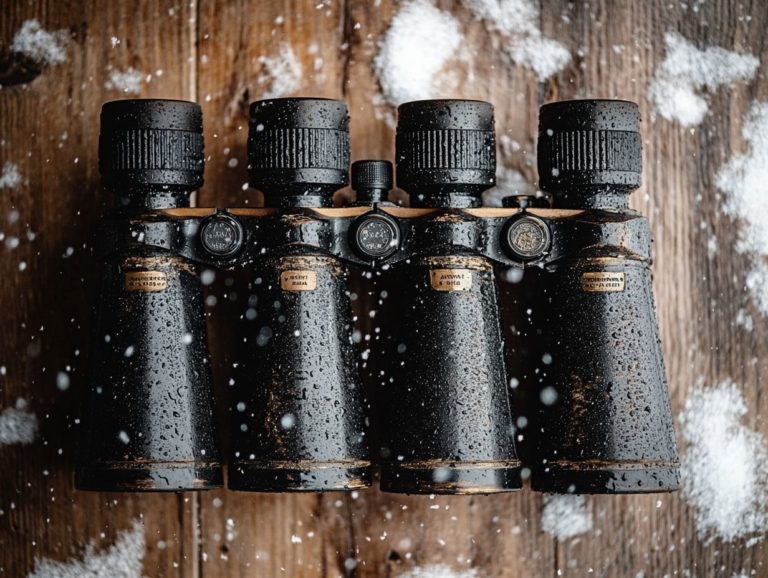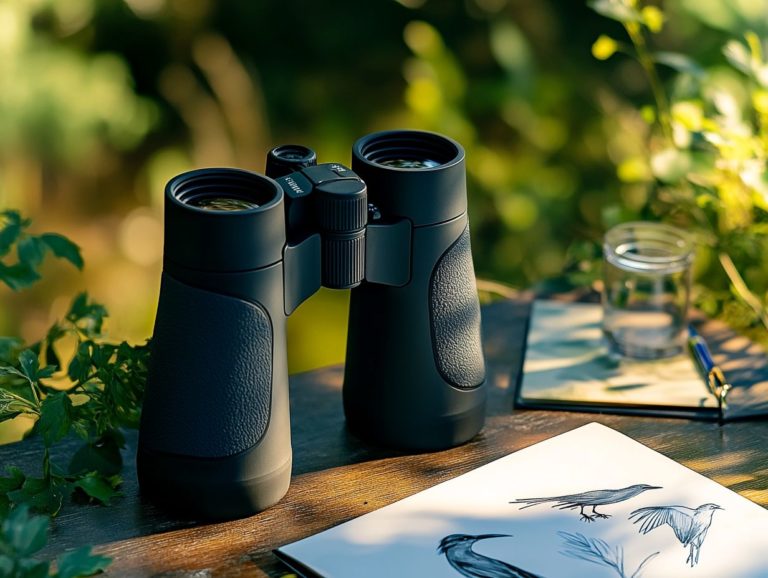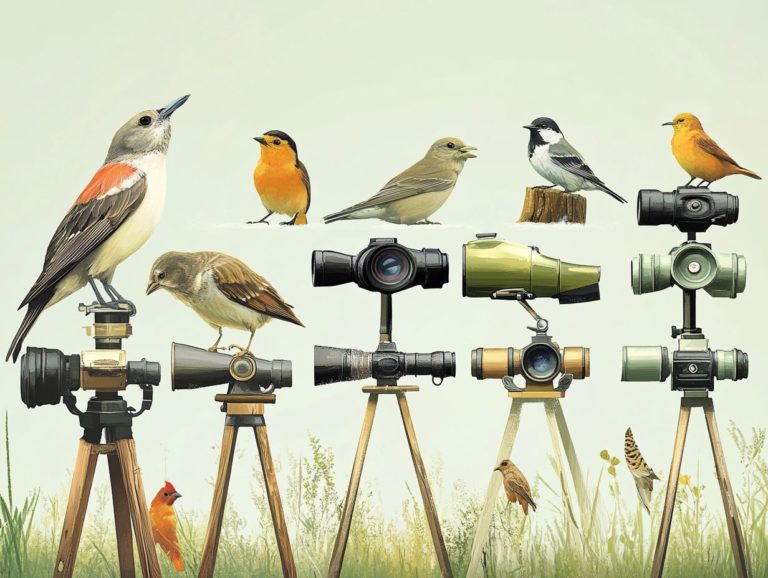Binoculars vs. Spotting Scopes: Which is Better?
When observing distant subjects be it wildlife, stunning landscapes, or thrilling sporting events binoculars and spotting scopes each offer distinct advantages tailored to different needs.
This guide delves into the essentials of both tools. It illuminates their uses, benefits, and key distinctions. By grasping features such as how well they work, size, and portability, you can choose the best option for your needs.
Explore further to uncover which device will elevate your viewing experience to new heights!
Contents
- Key Takeaways:
- Overview of Binoculars and Spotting Scopes
- Uses and Advantages of Binoculars
- Discover the Thrill of Spotting Scopes!
- Key Differences Between Binoculars and Spotting Scopes
- Which is Better for You?
- Factors to Consider in Choosing Between Binoculars and Spotting Scopes
- Frequently Asked Questions
- 1. What are the main differences between binoculars and spotting scopes?
- 2. Which is better for bird watching, binoculars or spotting scopes?
- 3. Do binoculars have better image quality than spotting scopes?
- 4. Can binoculars and spotting scopes be used for stargazing?
- 5. Are spotting scopes more expensive than binoculars?
- 6. Which is more versatile, binoculars or spotting scopes?
Key Takeaways:
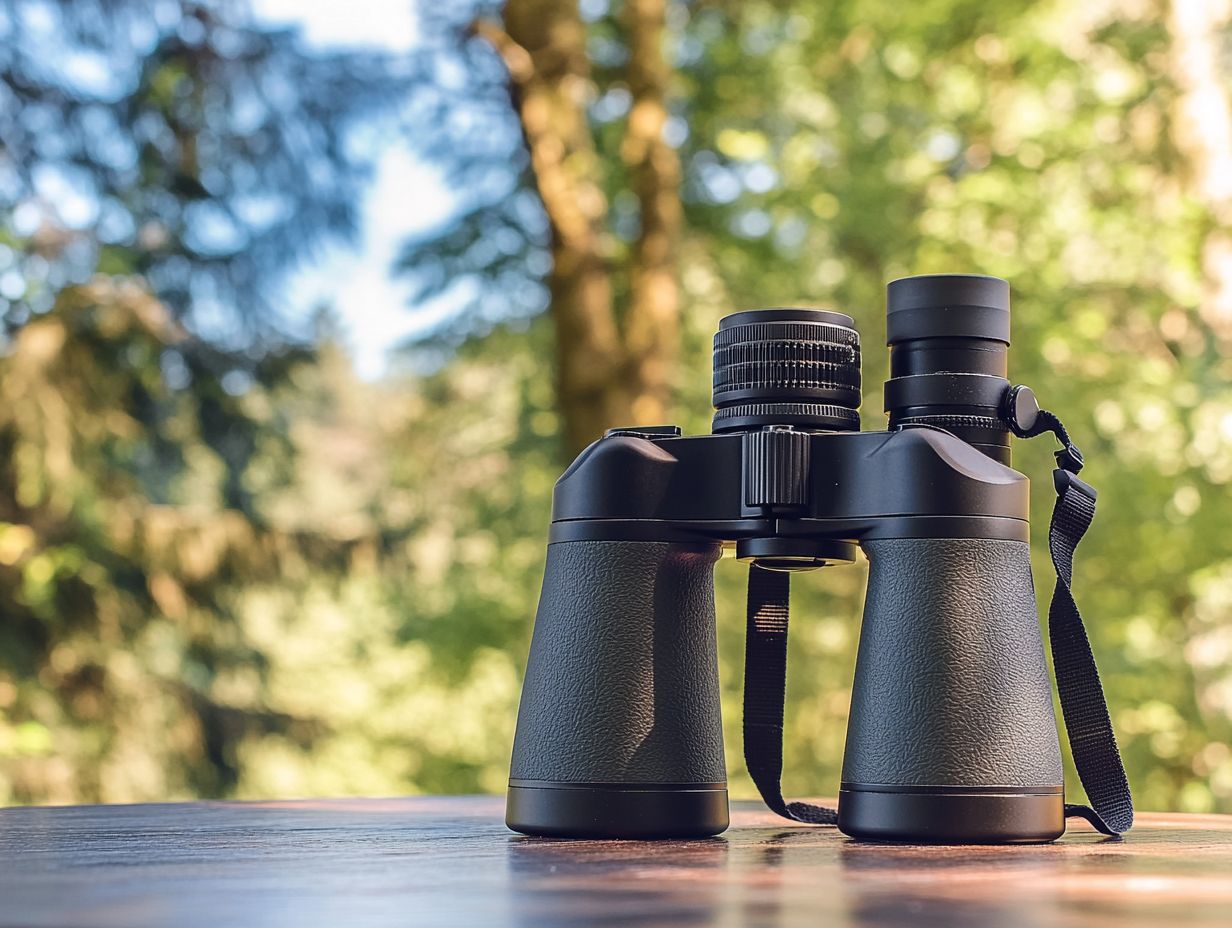
- Binoculars are versatile and great for general use, while spotting scopes offer more powerful magnification for long-distance viewing.
- Binoculars are more compact and portable, making them ideal for outdoor activities such as bird watching and hiking.
- When deciding between binoculars and spotting scopes, consider the intended use, optical features, and portability to find the better choice for you.
Overview of Binoculars and Spotting Scopes
Binoculars and spotting scopes are critical optical tools that enhance your outdoor experiences, enabling you to observe wildlife, partake in target shooting, or savor sports events with remarkable clarity.
Although both options offer detailed visual results, they cater to distinct needs and preferences, presenting varying levels of magnification and clarity. Whether you re an avid bird watcher or a dedicated hunter, understanding their functionalities can dramatically enhance your outdoor adventures.
Choosing the right model be it a high-power contender like the Vortex Diamondback or Bushnell optics is essential for achieving optimal performance.
What are Binoculars and Spotting Scopes?
Binoculars are your compact companions, crafted for a plethora of activities that immerse you in the wonders of wildlife viewing, outdoor adventures, and exhilarating sports events.
These handy devices empower you to observe distant subjects with ease and convenience, making them perfect for hiking, bird watching, or even stargazing. On the flip side, spotting scopes specialize in delivering higher magnification and larger objective lenses.
This makes them particularly valuable for those moments when you need to closely observe distant wildlife or breathtaking landscapes, offering a clarity and detail that binoculars simply can t match.
By understanding the unique characteristics and practical applications of both optical tools, including tripod use and optics deployment, you can significantly elevate your outdoor experiences, tailoring them to suit your diverse interests and preferences.
Uses and Advantages of Binoculars
Binoculars are invaluable tools for outdoor enthusiasts like you, enhancing your experiences across various activities. Whether you’re engaged in wildlife viewing, bird watching, or enjoying a sports event, their lightweight design offers exceptional portability, making every adventure more captivating.
Common Applications and Benefits
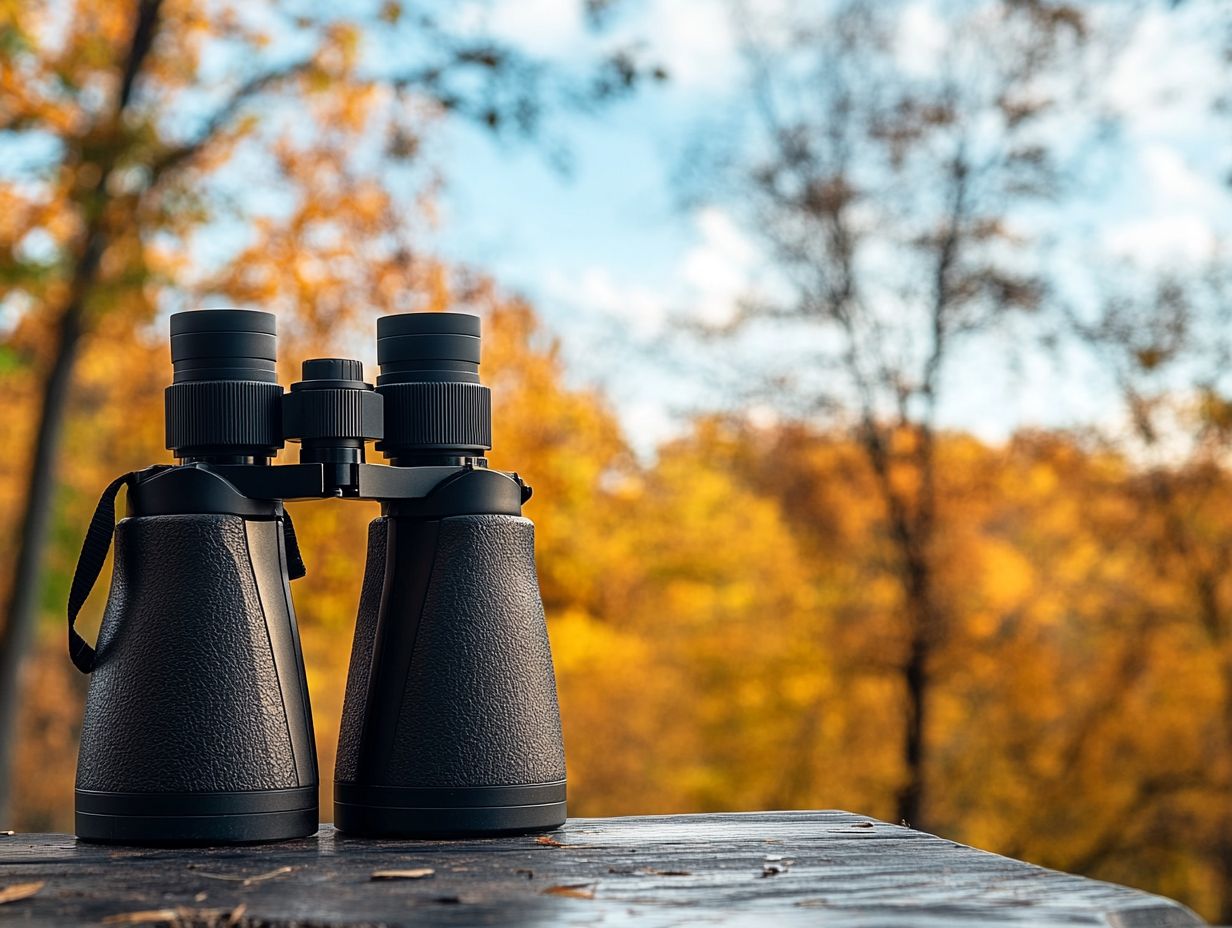
Common applications of binoculars include wildlife viewing, target shooting, and various hunting activities, allowing you to relish distant encounters with minimal eye fatigue.
In these situations, investing in high-quality binoculars proves particularly advantageous, as they often come equipped with advanced optics that enhance clarity and brightness.
Imagine hiking through a forest; spotting an elusive bird or deer transforms into a delightful experience rather than a strain.
During extended hours of bird watching or stargazing, using binoculars designed with ergonomic grips and comfortable eye relief can significantly reduce discomfort, making the entire activity much more enjoyable.
Choosing top-tier binoculars such as the 12×50 binoculars or 15×56 binos not only elevates your outdoor adventures but also encourages prolonged engagement, minimizing the risk of headaches and eye strain while you immerse yourself in nature’s beauty.
Don t wait! Dive into the world of wildlife observation with the right tool today!
Discover the Thrill of Spotting Scopes!
Spotting scopes are critical tools for outdoor enthusiasts like you, especially for wildlife observation and hunting. With their remarkable magnification capabilities, these scopes provide stunning clarity, allowing you to enjoy close-up views of even the most distant subjects.
Common Applications and Benefits
Spotting scopes are exceptional for activities such as wildlife observation, hunting, and target shooting. They deliver stunning visuals at various distances.
These optical devices combine power and clarity, inviting you to immerse yourself in your environment. Whether you’re tracking elusive animals during a tranquil morning hike or honing your precision during target practice, spotting scopes take your viewing experience to new heights!
With their great zoom ability and specialized lenses, you can capture close-up details of distant subjects, making them essential for avid birdwatchers or wildlife photographers.
You can also observe without disturbing the habitat, allowing you to appreciate the beauty of nature while remaining respectful, enriching your outdoor adventures even further.
Key Differences Between Binoculars and Spotting Scopes
Understanding the key differences between binoculars and spotting scopes can profoundly impact your selection process. When considering factors like how well you can see through the device, performance, field of view, and portability, these elements become essential for outdoor enthusiasts engaged in diverse activities.
Optical Features and Performance
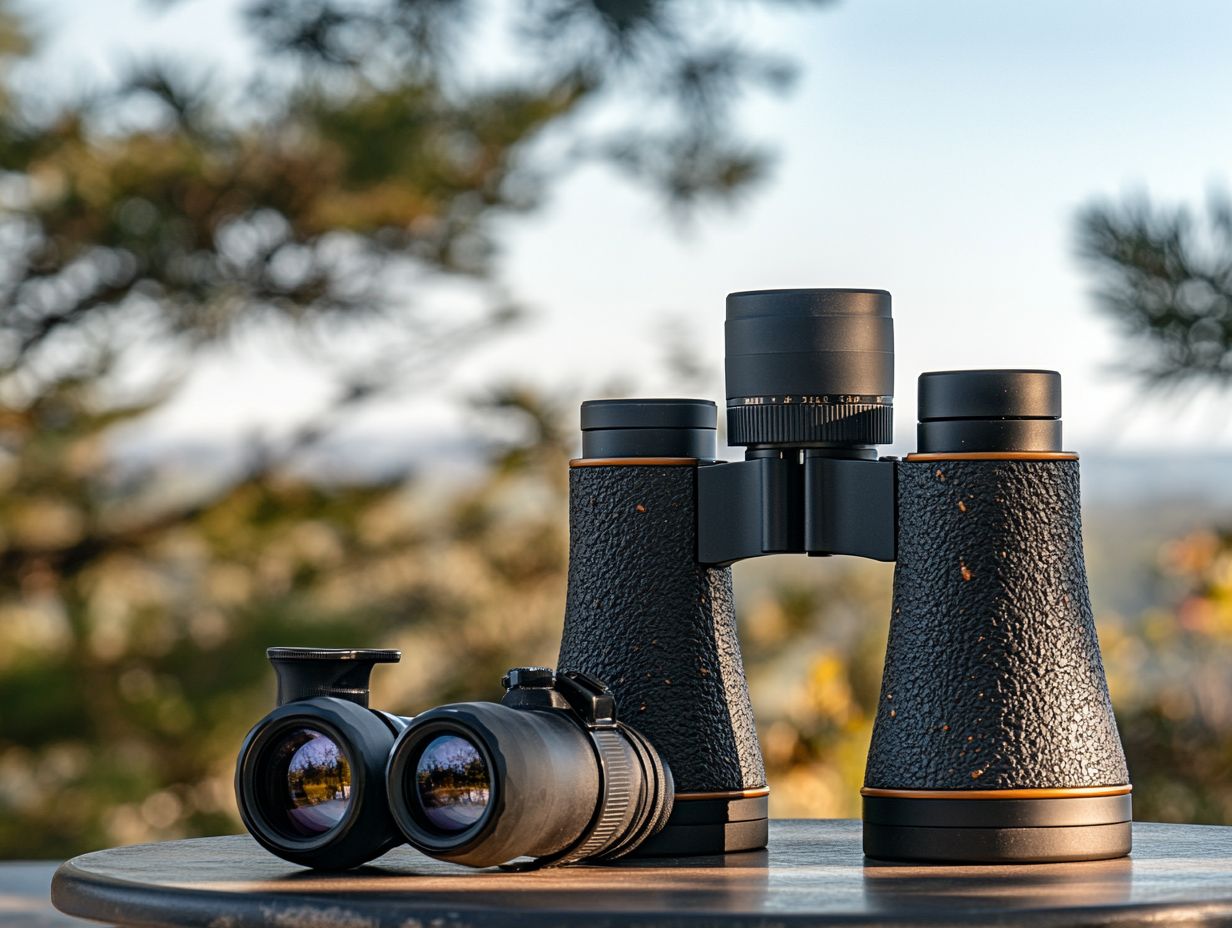
When comparing how well you can see through the device and performance, you’ll find that binoculars generally provide a wide field of view, while spotting scopes excel in magnification power, delivering detailed visuals tailored to your outdoor pursuits.
In various environments, whether it’s birdwatching or hiking, your choice between these tools can significantly influence your overall experience. Binoculars, with their portability and user-friendly design, enable you to scan large areas swiftly, making them perfect for tracking moving wildlife.
In contrast, spotting scopes excel in long-distance observation, offering unmatched clarity and precision for analyzing distant subjects.
This distinction highlights how each tool caters to different visual requirements. Whether you prefer the expansive perspective of binoculars or the meticulous detail of spotting scopes, recognizing their unique attributes is crucial for achieving optimal performance.
Size and Portability
Size and portability are essential factors to consider when deciding between binoculars and spotting scopes. Typically, binoculars are more compact and lightweight, making them perfect for various outdoor activities.
When engaging in pursuits like hiking, birdwatching, or camping, having gear that’s easy to carry can significantly elevate your experience. The weight of your equipment can become a burden during long treks, and a lightweight design allows you to stay mobile and attuned to your surroundings.
With their exceptional portability, binoculars empower you to quickly scan your environment without the hassle of cumbersome setups or hefty gear. This compactness facilitates swift adjustments, allowing you to seize spontaneous moments, such as catching sight of a rare bird soaring overhead.
For those who prioritize convenience alongside performance while exploring the great outdoors, opting for minimalistic yet powerful designs can truly make a difference.
Which is Better for You?
Deciding whether binoculars or spotting scopes are more suitable for your needs requires careful consideration of several factors. Reflect on the specific outdoor activities you partake in, the level of magnification you seek, and your budget for affordable options.
Each choice has unique advantages, and aligning them with your preferences will lead you to the ideal solution.
Try both on your next adventure and see which fits your style best!
Factors to Consider in Choosing Between Binoculars and Spotting Scopes
When choosing between binoculars and spotting scopes, it s essential to consider the specific outdoor activities you engage in. Factors like zoom, portability, and the potential for eye strain during extended use are also important.
If you enjoy hiking or birdwatching, lightweight binoculars are an excellent choice due to their easy transport and quick accessibility.
However, if you value detail perhaps as a wildlife photographer or stargazer you may prefer the superior zoom and clarity that a spotting scope offers.
Your personal preferences, including comfort, the type of eyeglasses you wear, and any individual vision issues, play a significant role in this decision.
Ultimately, evaluating the typical environments you frequent, whether rugged terrains or peaceful parks, will help you make the best choice for your adventures!
Frequently Asked Questions
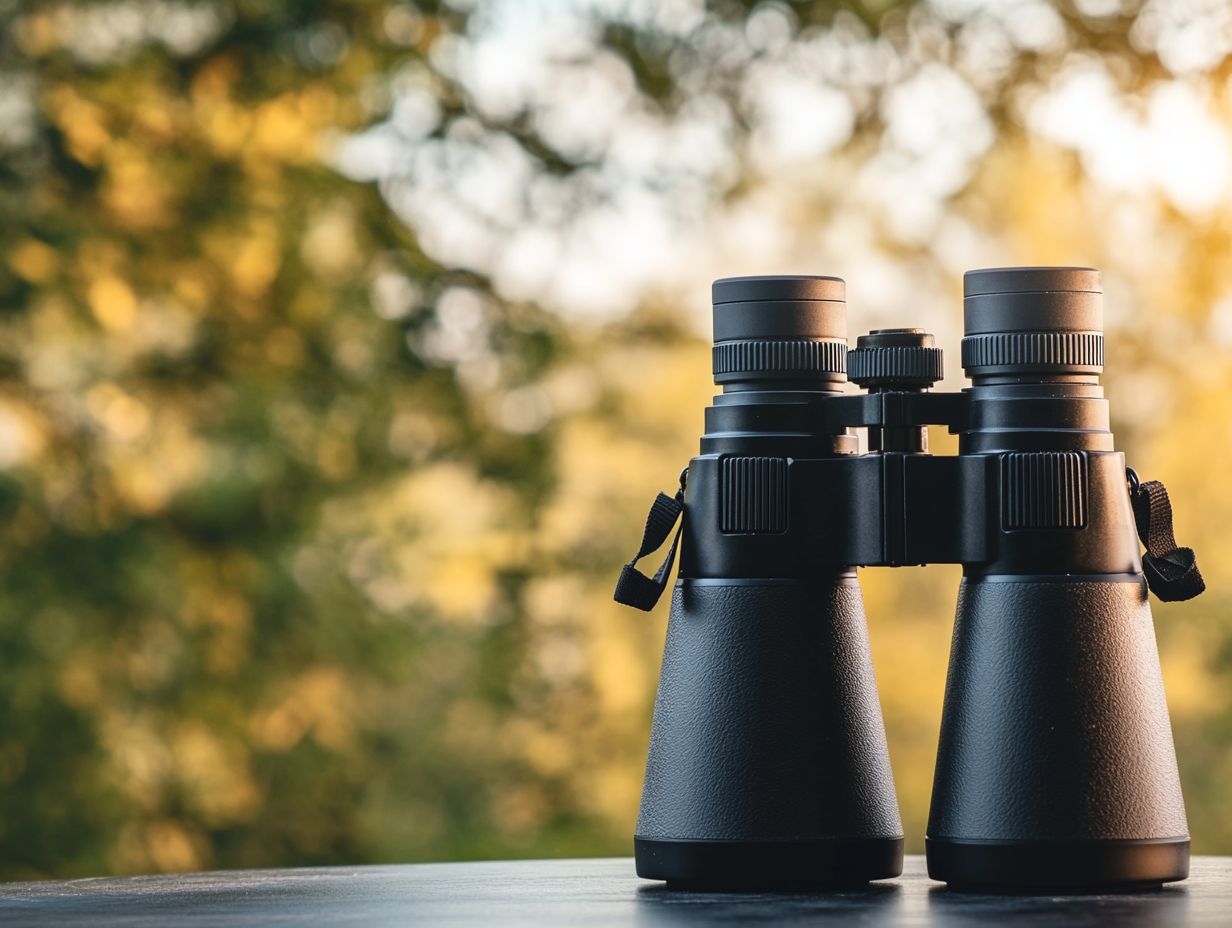
1. What are the main differences between binoculars and spotting scopes?
Binoculars and spotting scopes are both used for magnifying distant objects, but they have different designs and purposes. Binoculars are handheld devices with two eyepieces, while spotting scopes are larger, single eyepiece devices mounted on a tripod.
2. Which is better for bird watching, binoculars or spotting scopes?
While both can be used for bird watching, many bird watchers prefer spotting scopes for their higher zoom and clearer image quality. However, portable binoculars may be more convenient for quick and easy viewing on the go.
3. Do binoculars have better image quality than spotting scopes?
This depends on the specific models and brands being compared. Generally, top-of-the-line spotting scopes may have slightly better image quality due to their larger lenses and higher zoom capabilities.
4. Can binoculars and spotting scopes be used for stargazing?
Both can be used for stargazing, but spotting scopes may be more suitable due to their higher zoom. However, binoculars with larger lenses can also provide a clear view of the night sky.
5. Are spotting scopes more expensive than binoculars?
On average, spotting scopes tend to be more expensive due to their larger size and higher zoom capabilities. However, there are budget-friendly options available for both types of devices.
6. Which is more versatile, binoculars or spotting scopes?
Both have their strengths and can be used for various purposes. Binoculars are more portable and versatile for everyday use, while spotting scopes excel in long-distance viewing and specialized activities like bird watching and stargazing.

